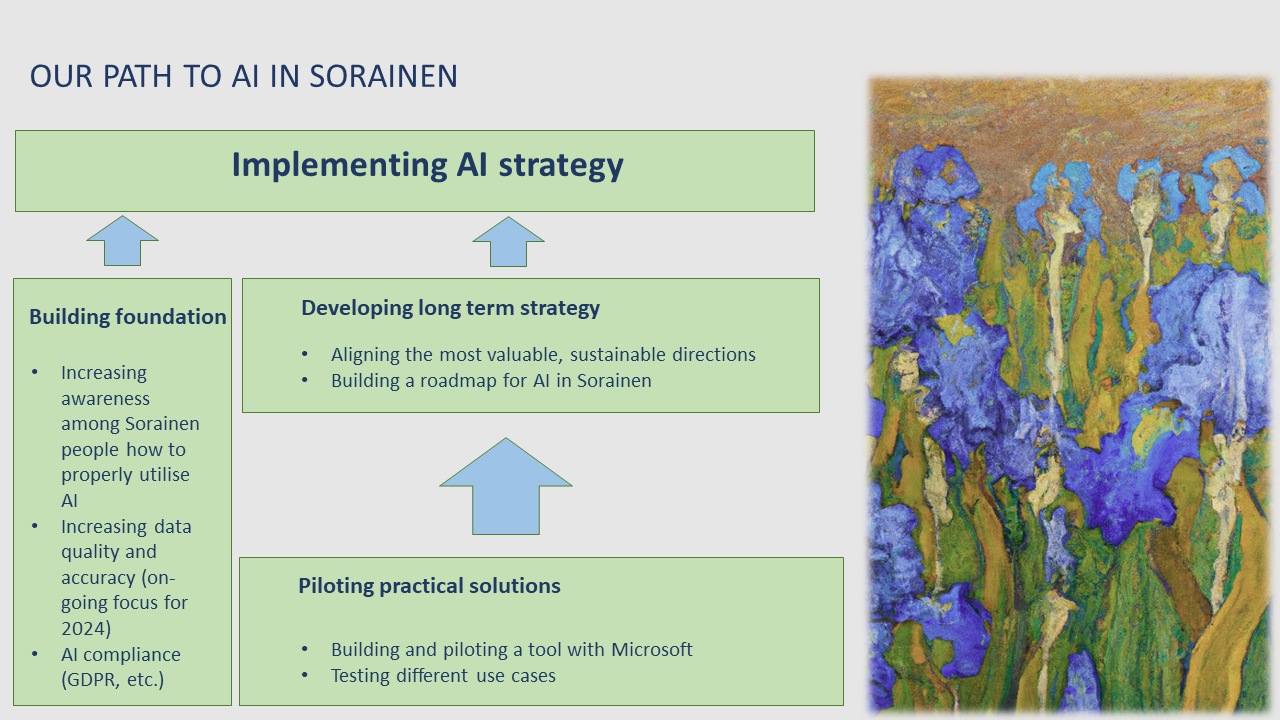Almost no profession has remained unimpacted by the ever-evolving technological landscape – and that includes the legal profession. At Sorainen we are aware that the integration of artificial intelligence, or AI in the legal profession, has already become a crucial part of staying ahead in the legal industry. As we step into the realm of AI, questions arise about its impact on the role of lawyers, billing structures, and the future of legal education. Our colleagues recently shared the Sorainen experience as we explore the potential transformations and challenges that lie ahead. Mārtiņš Stamguts presented at the YPO Baltic North workshop, while Madars Lapčenoks attended the Legal Tech Hub Innovator’s Forum. We’ve compiled a few key takeaways.
The Sorainen strategy
Our approach begins with a comprehensive understanding of AI. We’ve already established a diverse working group comprised of partners, lawyers, and business services experts. The group is a melting pot for innovative ideas, as well as experience from colleagues already familiar with AI tools, such as Chat GPT and Nuix Investigate. Ideas range from document analytics to direct integration with our document management systems (DMS) that enable the efficient retrieval of precedents, templates, and case-related information. AI tools can also improve information searches across various internal sources, potentially integrating third-party searches.
During the Baltic North workshop, a three-step implementation plan was formulated. The first step involves building a foundation by increasing awareness of AI and enhancing data quality within the organisation. Sorainen’s Knowledge and Innovation team will play a pivotal role in organising training sessions to raise awareness about AI, its functionalities, and applications in legal practice.

Industry-wide changes
One of the most significant advantages of incorporating AI tools into legal workflows is the liberation from routine, time-consuming tasks. This, however, raises a critical question: what will lawyers do with the extra time? Rather than downsizing, at Sorainen we envision a strategic shift towards more value-added activities. Lawyers can focus on complex legal analysis, client relationships, and developing innovative legal strategies, thereby enhancing the overall quality of legal services.
As AI streamlines processes, the traditional hourly rate system may also undergo a paradigm shift. With AI generating more value in less time, law firms may be forced to consider alternative billing models, such as project-based or value-based pricing. This shift aligns with the idea that the value of legal services is derived not solely from time spent, but from the outcome and expertise provided.
Legal education vs. the machine
As AI services advance, clients may increasingly turn to automated tools to generate legal documents. We recognises this trend and see an opportunity for collaboration. While clients may generate initial drafts using AI, lawyers will play a crucial role in refining and proofreading. The human touch in legal services remains indispensable, ensuring accuracy, context, and a nuanced understanding of the client’s unique needs.
While AI excels in certain tasks, the experience, intuition, and logical reasoning inherent to human lawyers remains unmatched. We’re confident that AI will complement, not replace, legal professionals. Sorainen maintains a strong commitment to delivering excellence, understanding that clients seek the unique blend of expertise and human insight that only skilled lawyers can provide.
Further integration of AI into the legal profession may also necessitate a revaluation of legal education. Future lawyers will need to be adept not only in traditional legal research, but also in leveraging AI tools. At Sorainen we’re committed to investing in training the next generation. We strive to ensure they possess the skills to harness the potential of AI, while maintaining critical thinking. It’s nuanced judgment that defines legal expertise.
A future of collaboration
At Sorainen we’ve always been committed to continuous innovation and evolution throughout our law firm. This year we were even recognised by the Financial Times as one of the most innovative law firms in Europe. That’s why we’re excited about a future that promises harmonious collaboration between human expertise and AI efficiency. We’re creating a legal environment that is both advanced and client centric. As the legal industry embraces this era of innovation, we remain dedicated to delivering excellence while embracing rapidly changing technological solutions.

